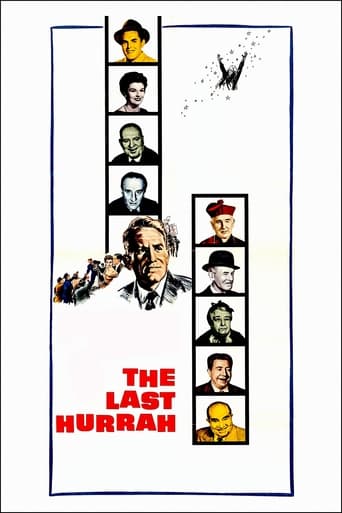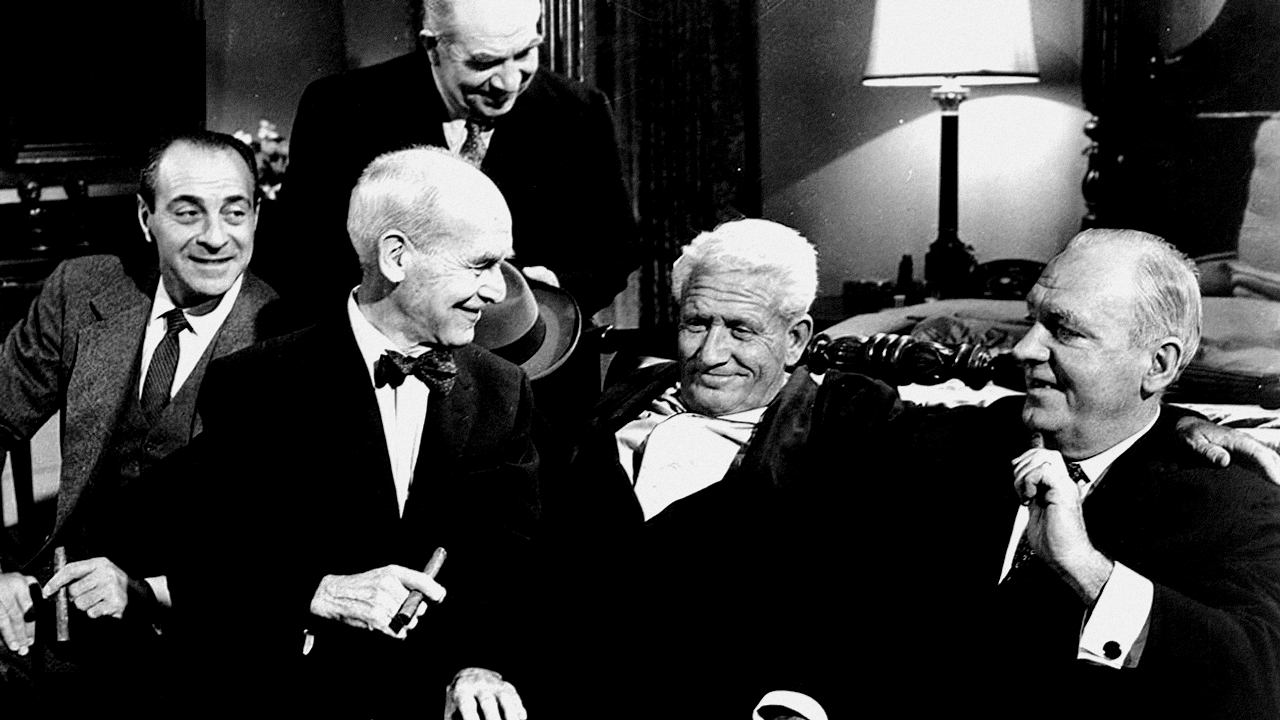valbrazon
I have been to the Etrange Festival in Paris and the director Jean-Pierre Mocky talked about this movie, he told as it's the rarest film of John Ford in France but it's his best for him. I didn't know John Ford and i never heard of this film before this festival. He gave me the envy to watch it so i did.I read a bit about John Ford and i understood as i mostly made western movies than political ones. I really wanted to watch it. The movie itself is interesting, we follow the life of a old man who wants to be a mayor another time in a town of United States of America. Many peoples don't know about how someone is elected as Mayor and we can see exactly all the stages.I highly recommend you this film if you like John Ford.
moonspinner55
John Ford produced and directed this well-cast but overlong, cumbersome and set-bound political melodrama, adapted from Edwin O'Connor's novel by Frank Nugent. Spencer Tracy is the over-confident New England mayor who resorts to dirty tricks in order to get re-elected, while his competitors come off like rubes with little experience. Some of the intentional humors--such as a banker with a pronounced lisp or a politician's wife caught off-guard for a television interview--are awfully broad for such a stately film, and many of the supporting bits are curiously over-played (as if Ford wasn't sure what tone to aim for). Tracy's innate professionalism and sincerity as a performer makes the picture worth-watching for his admirers, yet the Columbia studio-sets look artificial and the suburban surroundings (more California than New England) are barely exploited for their satirical possibilities. Remade as a TV-movie in 1977. ** from ****
whpratt1
This is a Classic John Ford Film dealing with old time politics in a small town, but hinting to be Boston, Mass. Spencer Tracy,(Major Frank Skeffington),"Guess Who's Coming to Dinner", plays the role of mayor who has been around for many elections and this is his final try at winning over his town. However, there are many changes starting to appear in the town and people are beginning to demand more improvements to their community. John Carradine,(Amos Force),"Prison Ship", runs the local paper in town and is not the best of friends with Frank Skeffington, however he hired Jeffrey Hunter as a reporter (Adam Caulfield),"A Kiss Before Dying",'56, who is a nephew to the mayor. It seems everybody smokes up a storm and in one scene the room is filled with smoke floating all over the place. (Glad those days are long gone) The film has many classic actors, Donald Crisp, Basil Rathbone and many more actors who make this film a very entertaining film; there is plenty of dry humor and drama, but entirely too draw out. I even noticed that Spencer Tracy used a great deal of cue cards, more than in any other film he appeared in. picture.
theowinthrop
In the early 1930s John Ford directed a relatively unknown actor in a forgotten film called UP THE RIVER, about prison. After that effort they went their separate ways, Ford usually directing at 20th Century Fox, Republic, and other studios (RKO for MARY OF Scotland), but rarely at MGM. And when he was developing into Hollywood's greatest director, Tracy, after an initially unrewarding period at Fox, went to MGM and became their leading actor-star. But neither managed to find a project to do with the other. Then in 1958 Ford approached Tracy to play Mayor Frank Skeffington, the hero of Edwin O'Connor's novel THE LAST HURRAH. This time, with both director and actor at their peaks, the result was far more memorable than UP THE RIVER had been.O'Connor's novel (a best seller in it's day) was a fictionalization of parts of the career of James Michael Curley, a man who became synonymous with the city of Boston. Boston's laws were peculiar regarding electing Mayors. After some bad experiences in the 19th and early 20th Century, the city decided that Mayors could not have consecutive terms in office - that they could serve as Mayor frequently but (like Grover Cleveland's two terms as President) not one term following another. This was okay with Curley, who ended up the most re-elected Mayor in Boston, serving four terms (each four years in length) over a period of two and a half decades, with a two year term as Governor of Massachusetts as well. A remarkable career for his day or any day. He was corrupt as they come - but he always pointed out that his corruption benefited the public (usually it did). It was like the old Tammany Hall dictum of their Sachem George Washington Plunkitt about good graft and bad graft. Good graft enabled the construction of roads, repairs of streets, public building projects (that were needed), bridges, tunnels, etc. In short, they enhanced or helped the city. Bad graft was like stealing the tin roof of the town orphanage to sell it to a metal dealer! Boston had many improvements under Curley, but plenty of pay-offs. Yet, he was a master at manipulating public opinion. The Irish and other ethnic groups (including Jews and African-Americans) became his voting blocks because the conservative opposition was hide-bound old Puritan - Yankee (and old money), and anti-minority. It worked like a charm for Boss Curley. It got him to the state house. It was only towards the end of his career (when he got involved in a postal fraud) that he went to prison for two years. He left prison and was re-elected Mayor of Boston!The novel emphasized the more "hamish" elements of Curley's success. His ability to have loyal lieutenants (here played by Pat O'Brien, Ricardo Cortez, James Gleason, and Ed Brophy as his gopher "Ditto") and to have loyal friends (even including opponents) like Anna Lee, Wallace Ford (as a crank political rival), Frank McHugh, and Jane Darwell. Even some of his critics like and respect him (even if they don't always support him), such as the Cardinal (Donald Crisp) and the local Episcopal Bishop (Basil Ruysdael). Tracy basks in this warmth, as well as that of his nephew Jeffey Hunter. It's good he has it, as his son (Arthur Walsh) is a total wash-out as an emotional support (the boy just likes dating pretty girls, going golfing, and hearing jazz). Tracy invites Hunter to follow the last campaign. He is smart enough to realize that this mayoralty campaign is the last of the old time, political clubhouse type elections. Tracy has noted the rising media of television and radio, and knows in a few years they will dictate the political future. Ford captures this horrible future well, showing the inept, wooden candidate McCloskey, with his wooden wife and kids (four of them), and a rented dog they don't like, on television. It's a rich film, and a warm one. The villains are evenly dispensed - Basil Rathbone as banker Norman Cass, John Carridine as editor Amos Force, Willis Bouchey as Roger Segrue are a trio of types, but each is different. Rathbone is a patrician, and dislikes Tracy for his background (he represents the loss of the patrician class's power to the lower classes). Carridine simply hates him for a piece of bigoted history on his own family's part. Segrue demonstrates that intolerance can be found in the Catholics as well as the Protestants. But there are differences. Rathbone, fed up with his ally Carridine at one point for his suggesting the banker could have put pressure on Ruysdael on a political matter, shoots a cutting statement that if it was up to Carridine (a former member of the Ku Klux Klan) they'd be burning a cross in the bishop's front lawn!The film ends with Bouchey suggesting that if Skeffington had it all to do he would do it differently. Skeffington smiles, and says "Like Hell I would!". When the novel came out James Michael Curley was still alive, and angry...he threatened to sue. But then he noticed the public liked this friendlier image of himself from the novel. He dropped the lawsuit, and wrote his memoirs. He entitled the memoirs, "I'D DO IT AGAIN!"



 AD
AD



